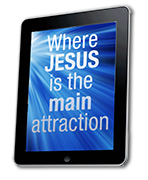

For a long time I mistakenly thought that Fred Shuttlesworth had pastored Sixteenth Street Baptist Church but this is not the case as my recent experience revealed to me. The role Sixteenth Street Baptist Church played in the civil rights era was to become, however, the central gathering place for the freedom movement as it gathered right in the heart of Birmingham, which was then America’s most segregated big city.
According to historians of the era it was Rev. Fred Shuttlesworth’s confrontational style that provided a counterbalance to King’s more measured approach. Together the two of them were used to inspire people to real action. In his memoir of the Birmingham campaign King praised “the fiery words and determined zeal of Fred Shuttlesworth, who had proved to his people that he would not ask anyone to go where he was not willing to lead” (King, 61).
This story was running through my mind as I walked into the sanctuary of the Sixteenth Street Baptist Church on Sunday, October 26, 2013. I knew that long before the bomb went off at Sixteenth Street Baptist, on September 15, 1963, killing four young children on a Sunday morning, it was Fred Shuttlesworth’s home that had already been bombed in 1956. And it was his church that was bombed in 1958. In many ways it was Fred Shuttlesworth’s courage that helped Dr. King use his rhetorical and leadership skills in Birmingham at the precise time when the civil rights movement began to make a major difference.
Thus as I walked into Sixteenth Street Baptist I wanted to see and feel the power of a movement that had transformed my life as a teen in the South. I wanted to see if the people in this place still loved and served Christ. I also went to see if the gospel was still clearly preached here fifty years after the bombing in 1963. (The anniversary of the bombing was just formally remembered at Sixteenth Street a few weeks ago.) The answer to all of my questions was a resounding yes.

Price used the presence of scores of black Alabama judges in his congregation that day to speak of “sentencing day” in God’s courtroom. He eloquently appealed to us to imagine a day when the guilty verdict had already been established and we were brought into court to be sentenced. He made it clear that this scene was the bema, or the judgment seat of believers before Christ in the text.

First, our methods must meet God’s code. There are requirements to be met. Shortcuts will always harm our work for Christ. If the inspector comes to see our work will he find it up to code? He will not allow our work to stand if it is not built on Jesus Christ alone. Everything you and I have comes by the grace of God. Paul says that I am only a subcontractor. God is the architect and Jesus is the builder. That metaphor works in the text and in the way I imagined life as I listened.
Second, Pastor Price said there will be a day of review. Our material must be inspected. This means that our true motives will be discovered. Are we using worthy or worthless materials? Price asked a series of effective rhetorical questions:
Are you serving to be seen?
What are you doing with your time and treasure?
Do you know that some of your stuff will be burned up by the building inspector?
Third, this day will be one of rewards. Some stuff we do now remains. Other stuff we will have to wait for and on that day it will be given. We will be given crowns to throw down at the feet of Jesus. These are based upon the inspector’s criteria.
Price finished by saying that he too was a sinner and at one time was all messed up. He said some people are just messed up; as he put it they are hooked up and jacked up. But just as I was about to be sentenced, he eloquently said, a thirty-three year old attorney walked into the court room and said, “He is messed up your honor but I died for all of that because I love him.” This young attorney appealed to his own blood and the case was dismissed. At this point the people at Sixteenth Street responded with great praise.
I took a moment to thank Pastor Arthur Price for his sermon after the service. I spoke to a few people (briefly) and then quietly walked out into the famous public park across the street from the church where civil rights history was made. I tried to imagine a scene right here back in the fall of 1963. I shed a few tears, rejoiced in God’s grace and then gave thanks for the faithful witness of the Sixteenth Street Baptist Church, a church still preaching the gospel to the next generation. I returned to Chicago encouraged again to preach “the good news of the kingdom of God” in every way possible. This alone is the power of God!
I was also glad that I chose to visit Sixteenth Street Baptist Church where I heard the good news. I needed to be reminded that I am forgiven by God’s grace alone. In ways I cannot even put into words this is what happened on a gorgeous fall Sunday in downtown Birmingham.
Related Posts
Comments
My Latest Book!

Use Promo code UNITY for 40% discount!






